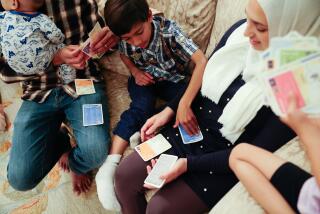Holidays Mean Caution for Allergic Children : Health: Christmas trees are a major seasonal offender for children sensitive to mold and dust.
- Share via
The holiday season is supposed to be fun, but for children with asthma and allergies it’s a time to be wary.
Allergens and irritants that trigger allergic reactions and asthma symptoms are abundant at this time of year, physicians say, but even youngsters with severe asthma can celebrate the holidays--if parents take precautions.
It may seem impossible to avoid certain foods, pets, cigarette smoke or house dust, but that is the only effective way to protect a youngster who is sensitive to them, according to Dr. Daniel Hamilos, a staff physician at the National Jewish Center for Immunology and Respiratory Medicine in Denver.
Preventing symptoms with medication helps, especially when travel or dining away from home can increase the risk of severe reactions to foods, cold or other elements in the environment.
“If you know your child has difficulty at this time of year, the child should go on preventative medication,” said Dr. Allan M. Weinstein, a Washington, D.C., allergist and the author of “Asthma, The Complete Guide to Self-Management of Asthma and Allergies for Patients and Their Families.”
Parents should never take for granted a child’s allergic symptoms, said Weinstein. “Some children may have symptoms at certain times of the year, or under certain circumstances.”
A major symbol of the season, the Christmas tree, can cause problems for some children if a live or cut tree is kept inside the home for more than a couple of weeks.
A Christmas tree left standing is a breeding ground for house dust and for mold spores that will grow in the water used to keep the tree fresh and green, said Dr. Gary S. Rachelefsky, clinical professor of allergy and immunology at UCLA.
For children sensitive to mold and dust, “the resulting discomfort may far outweigh the pleasure,” he said. “There is no way to keep Christmas trees dust- and mold-free.”
Weinstein said problems result when “things that are not normally brought into the house, like trees, are now all of a sudden in the house. They can trigger allergic responses.”
He suggests that families with allergic children buy an artificial tree and that any other such live decorations be used outside the house.
An artificial tree will reduce the growth of mold, but it should be wiped or spray-washed clean if it is being re-used, to get rid of accumulated dust. Christmas decorations that have been stored during the year should also be wiped clean.
Rachelefsky, who is also a pediatric allergist and allergy researcher at the Allergy Research Foundation in Los Angeles, said it is elimination of the dust mite--a tiny organism that lives in dust--that reduces the severity and frequency of allergy symptoms. The mite, ingested through the nose, is what causes the allergic reaction.
Food, pets, cigarette and cigar smoke, fireplace fires and cold air can also trigger allergic and asthmatic symptoms in children.
But food allergens are difficult to control, especially during the holidays, when more meals are eaten away from home.
If a child has shown signs of allergy to identified foods, “use extreme caution when sending the child out of your own home,” Hamilos said. “You shouldn’t trust other people’s discretion in determining your child’s intake. They don’t have the knowledge to take care of it.”
He suggests parents talk with the host, specify what the child can eat and which foods he can’t. “And never send him into a situation when there is any question about what will be served.”
Parents who ignore this caution “have their heads in the sand,” Hamilos said. “The child has no desire to be sick. A young child may not be able to verbalize the problem.” Items such as nuts, used in prepared turkey dressings, shellfish, which may be whipped in a dip or spread, and sulfites used in salads and dips are common triggers of food allergies. Pickles, too, if they’re sold in jars, contain sulfites.
When a holiday party is catered, it can be impossible to determine the food ingredients, so children should be instructed to avoid any prepared food they’re not sure of.
Tobacco smoke can also be a problem at holiday time.
Bringing a child with allergies or asthma into the home of a friend or relative for a Hanukkah meal or a Christmas visit where smoking is permitted will expose the child to an irritant known to cause respiratory distress, Rachelefsky said.
Symptoms may not be seen for six to eight hours after the exposure.
“When you get an invitation,” Rachelefsky advised, “find out if there might be smoking there. If there is, you shouldn’t go. You’re not limiting your children, you’re just being practical.”
Parents should also control smoking in their own home, even when it means refusing a beloved guest. Permitting cigarette or cigar smokers to indulge at your holiday dinner is “stupid,” Rachelefsky said.
“A big sign should go up. Take the ashtrays away and if anyone smokes, kick them out. If they don’t like it, you don’t need them for friends.”
Children should be instructed to set limits when grown-ups indulge in holiday cheer and neglect to enforce the rules. They ought to be taught to protect themselves.
“I have a 4-year-old patient who told me, ‘Dr. Rachelefsky, my parents have the nerve to make me go to Aunt ----’s house where there was cigarette smoke.’ A child can tell a parent, ‘I’m not going there. They have cigarette smoke.’ ”
Even children as young as 3 can be made partners in their own care, the physicians said. Preschoolers are capable of acting responsibly for themselves and can be trained not only to recognize allergy triggers, but to take preventive medications on time and to know when to call for help.
Refusing a small child who wants a kitten for Christmas may seem impossible, but allergy doctors warn that kittens, ponies, bunnies, puppies, hamsters, gerbils and mice should never be given to children with allergies or asthma.
Prolonged exposure to the animal’s dander or urine will produce the classic warning signs: nasal congestion, sneezing, itchy skin and wheezing.
Although families with allergic children shouldn’t have pets in the house, Rachelefsky said, some parents buy them anyway. “They get rid of doctors before they get rid of pets.”
He recommends hermit crabs, reptiles, turtles or fish, and Hamilos prefers fish, “the safest pet,” he said.
The average child with allergies or asthma has mild to moderate disease that can be well managed, the physicians said, but parents should note that asthma fatalities have increased 25% since 1979, despite a growing awareness of it at all levels of society.
Hamilos said denial of the problem by parents or children, continued exposure to known allergy triggers and under use of medication are the principal reasons for the increase in fatalities.
In particular, exposure to animal dander can result in severe symptoms that may not be easily reversed.
Smoke from gas- or wood-burning fireplaces that aren’t well-ventilated or enclosed can also cause breathing problems for children with allergies.
Soot or ash breathed into the lungs can precipitate an asthma attack, Hamilos said, and frequent exposure to fireplace smoke can increase the number of respiratory infections for an allergic child.
Hanukkah candles that burn in a well-ventilated room aren’t a problem, the physicians said, because the candles are small, burn quickly and the smoke they produce is not significant.
Visiting a home where furniture is upholstered with feathers or where there is heavy perfume or hair spray in the air can also cause reactions in sensitive children.
Parents should call ahead, ask questions and express their concerns before they visit and limit the child’s exposure to a couple of hours instead of spending the day.
Children accompanying their parents on holiday ski trips or who are visiting relatives in cold climates should wear a scarf over their nose and mouth to help warm and moisten the air. They might also benefit from an inhaled bronco-dilator, such as Ventolin, or a preventive medication such as Intal--sodium cromolyn--which help keep airways from constricting during exposure to cold air or vigorous exercise.
More to Read
Sign up for Essential California
The most important California stories and recommendations in your inbox every morning.
You may occasionally receive promotional content from the Los Angeles Times.













